You are starting a new business.
Huge plunge.
But you don’t want to just “start a new business” and call it a day. Nope. You want to start a new successful business … which is going to require a well-thought-out business plan … which requires a (free) business plan template, of course.
The ever-essential business plan around your proposed startup business should include every nitty-gritty detail, from the company description to your target market and financial projections.
Sounds like a lot, right? It is. Writing a plan for your business from scratch can be overwhelming, especially if you’ve never done it before.
But alas, that’s where a free business plan template can be a life-saver.
This article will provide a step-by-step guide for creating a plan using one of our free business plan templates. Because at monday.com, we want you — and your new venture — to succeed.
What is a free business plan template?
A free business plan template is a document that outlines every critical aspect that should go into your business plan — and you don’t have to pay anything for it. It guides you and makes it easy to focus on necessary components without going overboard and including too much information.
A good template should cover each stage of managing and starting a business. This means your template should act as a step by step guide on how to include the following information:
- Your business’ core activities
- Its goals and objectives
- How it plans to achieve these goals
Because business plans are an essential component of any organization’s operational roadmap, a template is a must-have tool for all entrepreneurs and startup business owners.
Writing a complete business plan is key to documenting business models, creating accurate financial projections, and turning your business idea into reality.
Why use a free business plan template?
Creating a business plan with a free template might not sound like much, but it can lead to a more successful business. Here’s are 6 reasons why:
1. Helps secure funding
You can’t apply for financing proposals without a formal business plan. Using the correct format from a professional template is vital to show all parties of interest, including investors and financial institutions, that you are committed to building and growing your enterprise.
Investors will carefully review your business plan before agreeing to meet you in person, let alone write you a check.
2. Makes business plan look more professional
Creating a business plan from a template shows that you are serious about your business.
Entrepreneurs who can present comprehensive business plans instantly appear more professional and prepared to investors, partners, and consumers alike. The more detailed and in-depth your plan is, the more confident you will appear.3. Gives business direction
Drawing up a step by step business model provides you with a roadmap for future operations and times of doubt. Without a concise business plan template, you may constantly change your strategies and goals without bearing your long-term milestones in mind.
Using a template gives you direction and ensures that every choice you make furthers your business’s ultimate goals and objectives.
4. Helps establish important milestones
A template will help you identify the long-term milestones that are important for the success of your venture. Setting milestones from the beginning can help you determine if your business is on the right track.
5. Helps assess the feasibility of the venture
Not all business plans translate into thriving real-world businesses. Using a business plan template helps you determine how viable your business plan is while minimizing opportunity costs. It also encourages you to research target markets and your competitive landscape.
6. It’s FREE
This might be obvious, but it’s still important. Creating a business plan can be a time-consuming, expensive process. Hiring a professional business consultant for your business plan will cost, on average, $399.
You don’t have to spend money outsourcing a business plan writing service with a free business plan template. Instead, invest those funds elsewhere in your startup business.
What are some examples of free business plan templates?
There are different types of business plan templates to choose from depending on your type of business and reason for writing a business plan.
Here are some sample business plans based on different templates.
Startup business plan template
A startup business plan is like a standard business plan; only this document is written specifically for a startup business. It is often presented to potential investors to obtain startup funding.
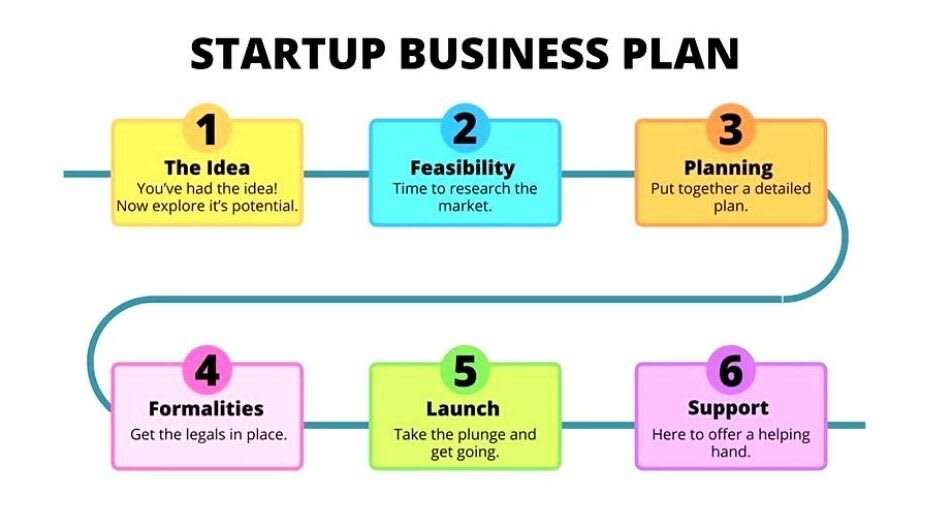
Startup plans are preliminary plans that can be tweaked as the firm grows. These documents include information like the idea for the business, a description of the product or service, a marketing plan, and profit projections.
Strategic business plan template
Strategic business plans outline the strategies that a business will use to achieve its goals.
These plans are generally for internal purposes and are based on a SWOT analysis. This plan should outline how specific strategies will move the company toward its milestones and allocate resources.
One-page business plan template
A one-page business plan is a simplified version of a standard business plan. It is a single-page document that focuses on the core aspects of your business.
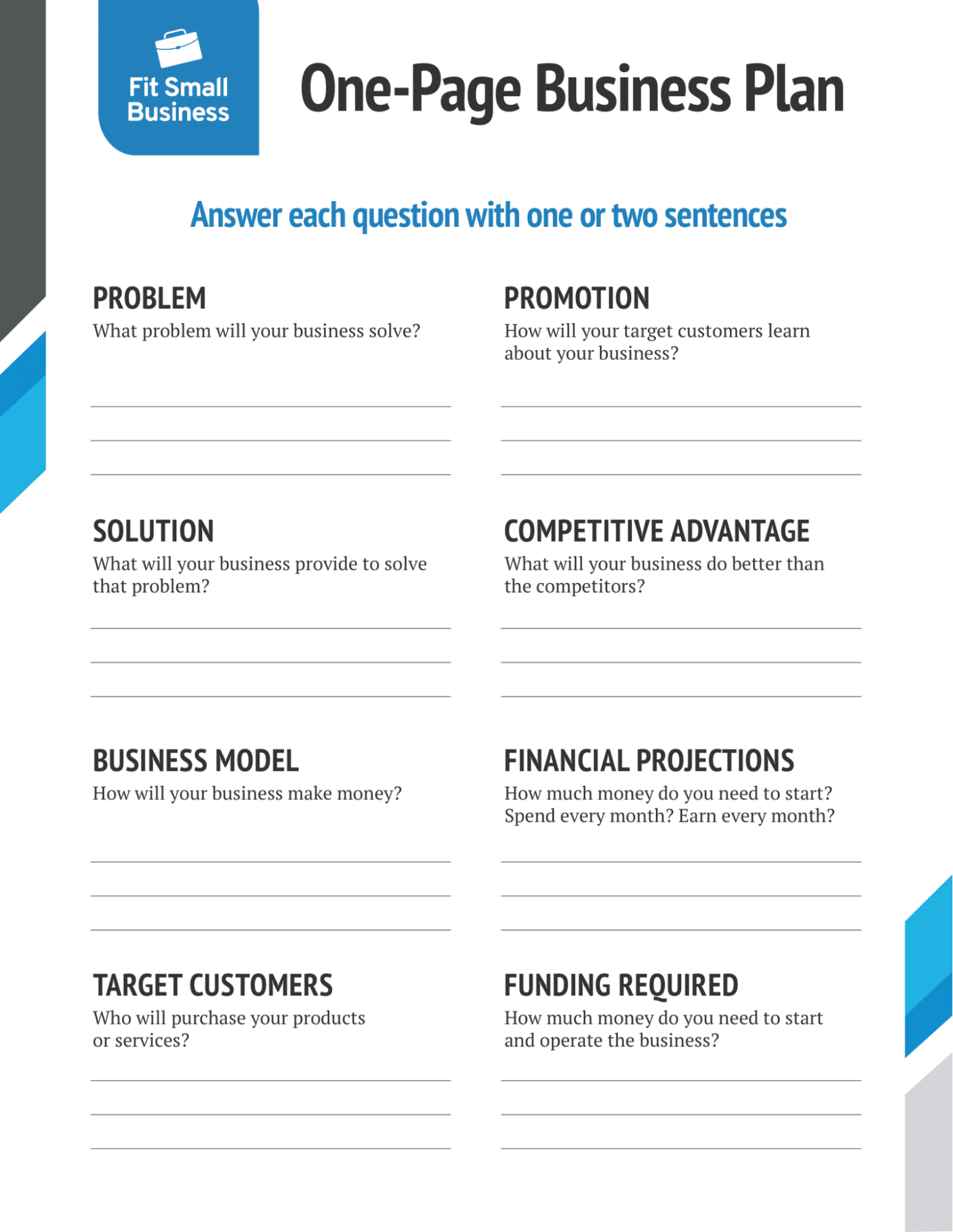
This template doesn’t include descriptions, summaries, and background details. Although concise, it still contains all the necessary information, including the business model, financial projections, and target market.
Operational plan template
A template for an operational plan, also known as an annual plan, focuses on sketching out the day-to-day operational actions a team needs to take to reach significant goals. It outlines the duties and responsibilities of the management team, various departments, and staff and how they should contribute to its overall success.
7 elements of a business plan
A traditional business plan template should include these essential sections.
1. Executive summary
This should be the first section of your business plan. The executive summary covers what you expect your business to achieve and highlights what you will discuss in the remainder of your plan.
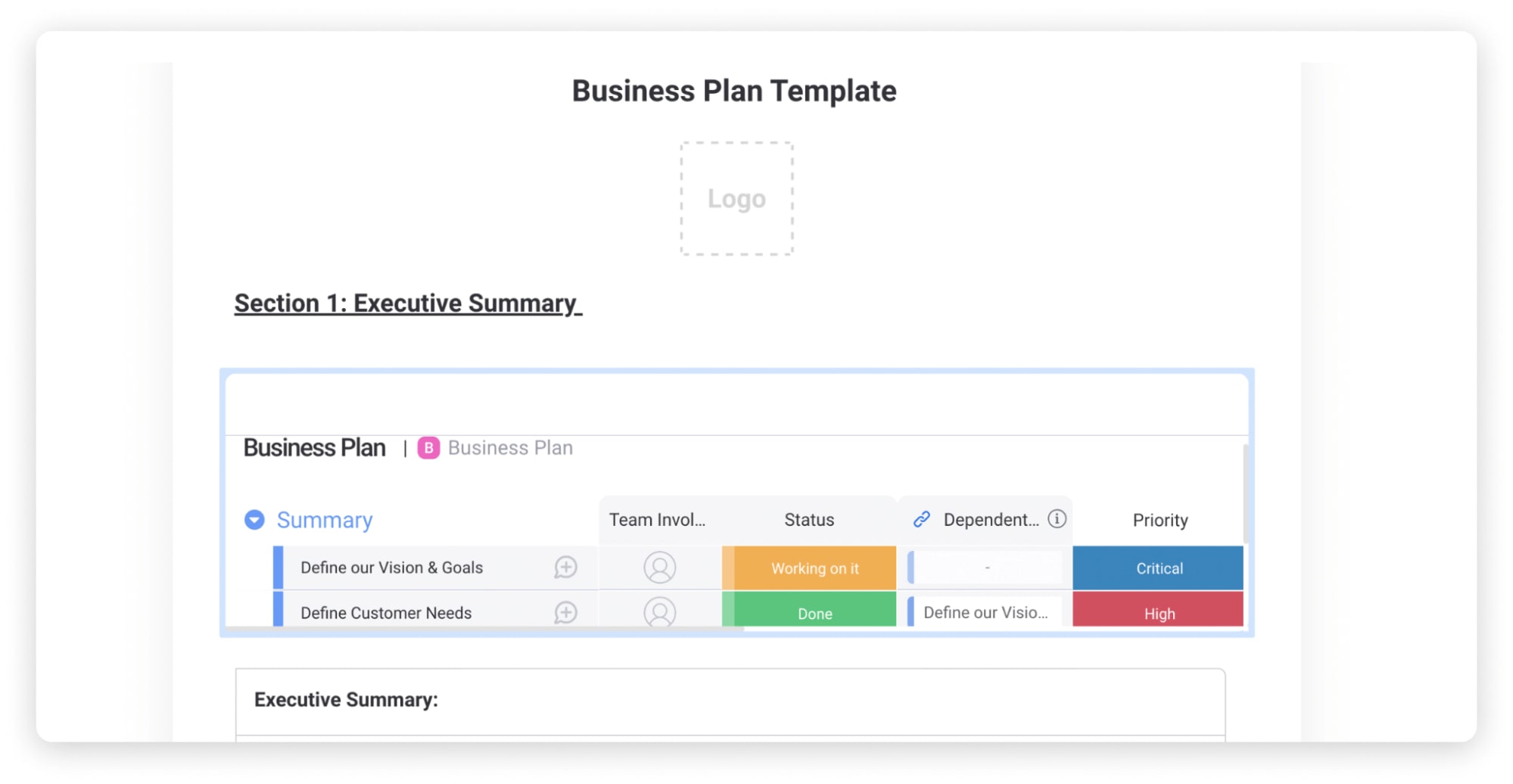
2. Company description
Your company description should include important information about your business, goals, and target audiences. Use this section to explain your core offerings for customers and how your business stands out from its rivals.
3. Product or service offered
This section should include a detailed breakdown of your products and services and how they have been tailored to meet current demands. Some other information to include is:
- Your suppliers
- The cost of manufacturing your products
- Your projected profit margins
- Any relevant information about copyrights and patents
4. Target market analysis
Your target market analysis should visualize your target customers and their purchasing habits and demands. Use this section to show that you have a solid understanding of your industry and target audiences.
5. Marketing plan
The marketing plan section of your business plan should describe how you plan to reach your target customers with your core marketing messages, as well as your products and services. Detail the steps you need to promote your products, including your budget and marketing strategies.
6. Competitive analysis
This section should compare your business to your direct and indirect industry rivals. Speak about what your competitors are doing and if they are failing or succeeding. Mention any issues that could impact your entry into the market here. It doesn’t have to be a comprehensive competitive analysis but it should cover at least the lay of the land and some of your main competitors and their marketing/business strategies. Need help documenting your analysis? Check out our competitors analysis template.
7. Financial projections
This section should break down your financial goals and projections that you’ve calculated using market research. Include your anticipated revenues for your first year of operation. It’s good to include an appendix with additional financial data (financial statements) if you’re using your plan to apply for business loans.
And of course … monday.com’s free business plan template
Old-fashioned business plans made in a spreadsheet or word processor are static and easy to forget.
monday.com’s comprehensive business plan templates make drawing concise business plans and financial projections a breeze.
Here are some of the many ways our business plan template will help you communicate your vision and strategy:
Seamlessly share your business plan
Besides financial investors, other invested parties will want to see your business plan — usually referred to as stakeholders—business partners, employees, bankers, suppliers, customers, consultants, and even friends and family.
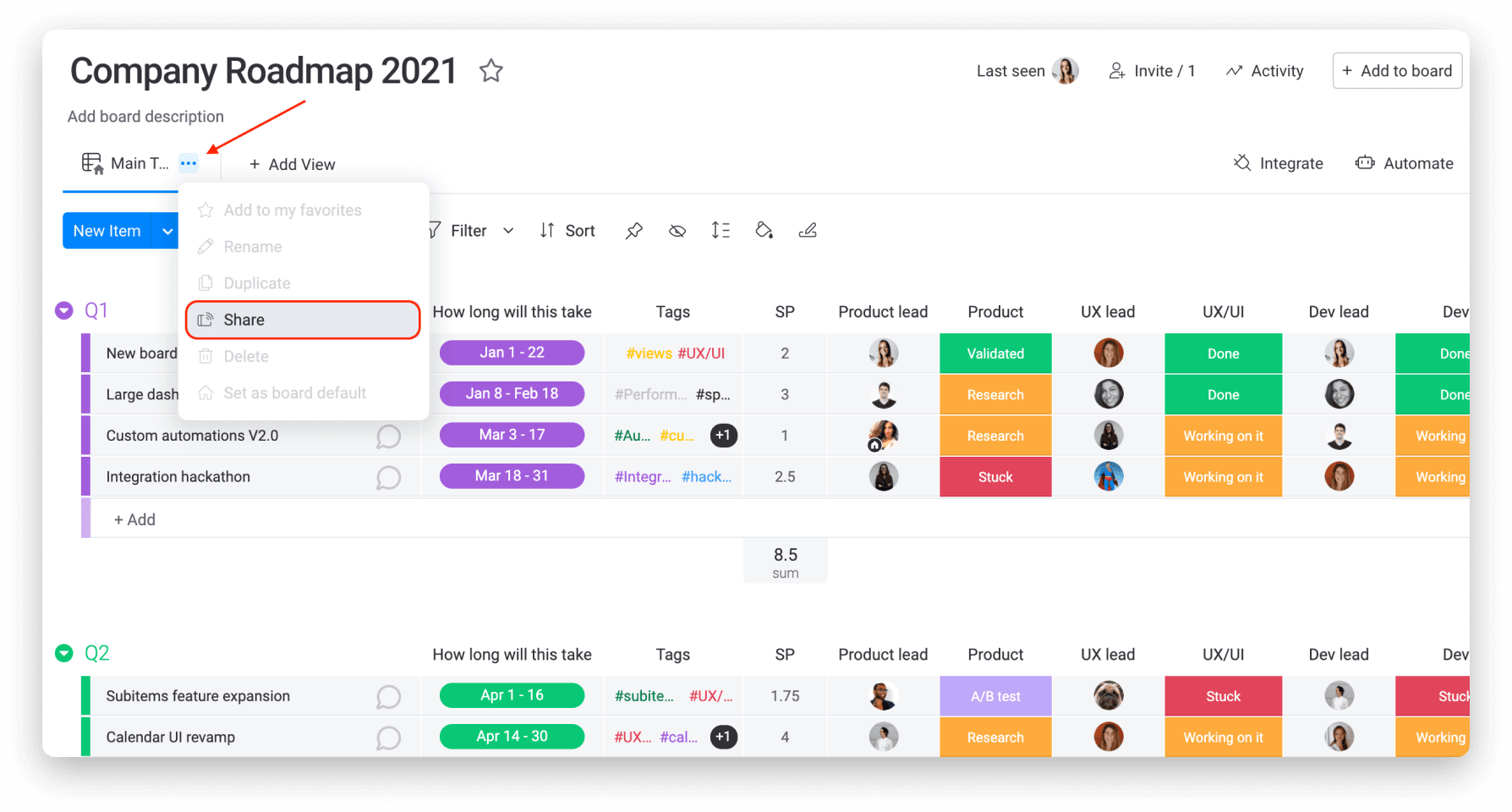
Rather than back and forth emails, make your business plan accessible to whoever you want with our “share view” options. Easily create and send a shareable link to your business plan. Or send out a read-only version to ensure no one makes any unwanted edits.
Hide certain information
Maybe you don’t want everyone to know your startup business’ financial projections. We get it. Planning the financial aspects of a startup business is tricky.
With monday.com’s template, you can hide certain business plan sections by hiding columns or using Board Filters.
Once you’ve excluded any sensitive information from your business plan, you can save this new view of your business plan to be easily accessible later. In addition, by creating a view according to the exact parameters you want to see, you won’t have to keep editing your business plan according to what information you want to have displayed.
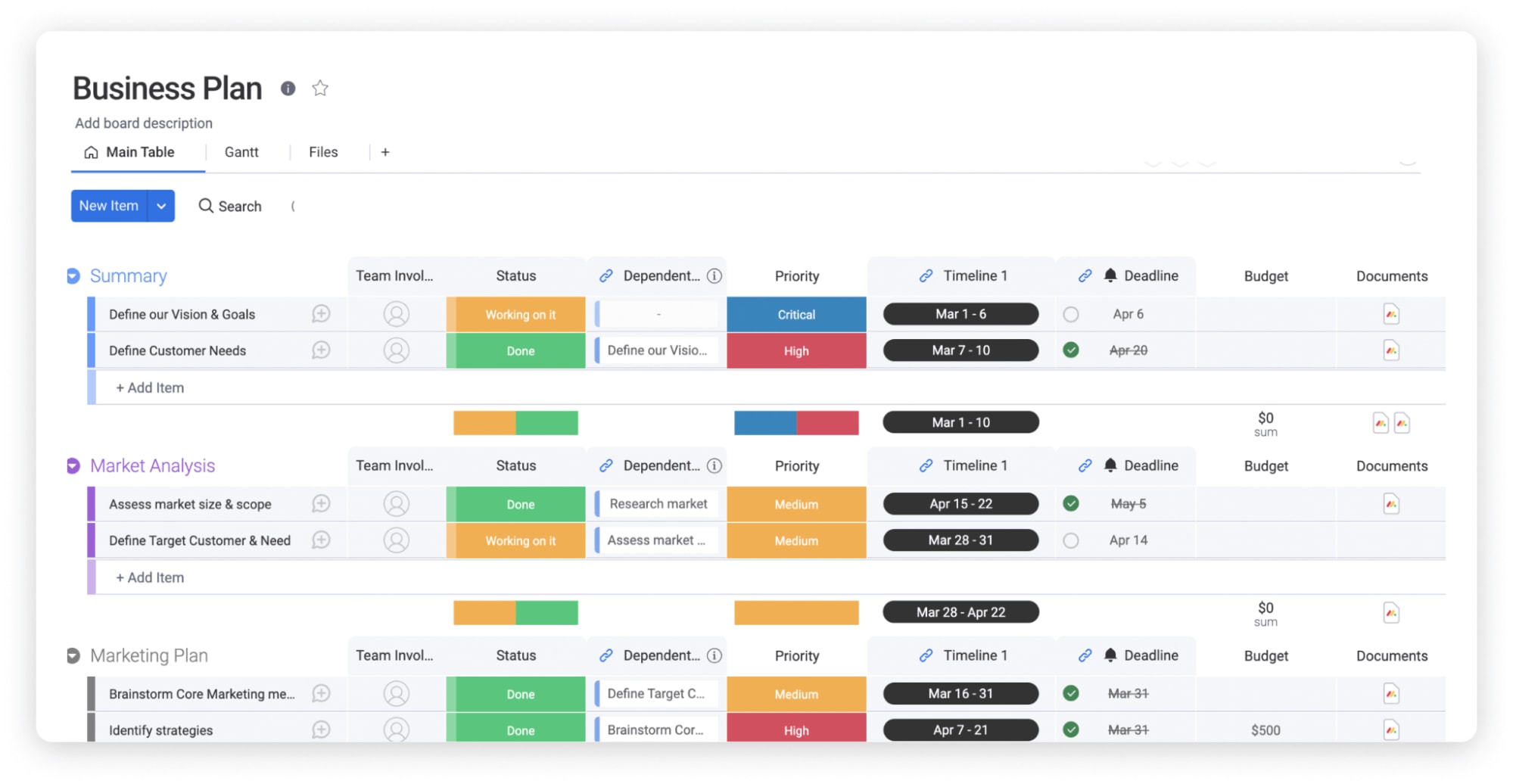
Transform your business plan into action
You’ve written a stellar business model, got the funding you need, and are officially starting a business. So what happens to all that hard work you did for your business plan?
monday.com helps you execute your business plan by turning it into actionable tasks. Our platform lets you centralize all your work, tools, processes, and files, including your business plan and associated data, into a single Work OS.
Build your ideal workflow by turning your business plan into a project timeline, budget template, or marketing strategy. Have access to all of the documentation you need instantly in one convenient location, maximizing your productivity and organization.
FAQs about business plan templates
How do I write a simple business plan?
monday.com’s business plan template gives you all the tools you need to write both simple and more complex business plans.
Should you use a template for a business plan?
Yes! A business plan template will give your plan structure and ensure that you can secure funding and guide your business’s growth.
What is the best format for a business plan?
A template provides the best format for a business plan, as it breaks down all the essential information you need to include. Find all the business plan templates you need at monday.com.
Who should develop business plans?
Any new business owner (or someone aspiring to start or acquire a business) should develop a business plan.

